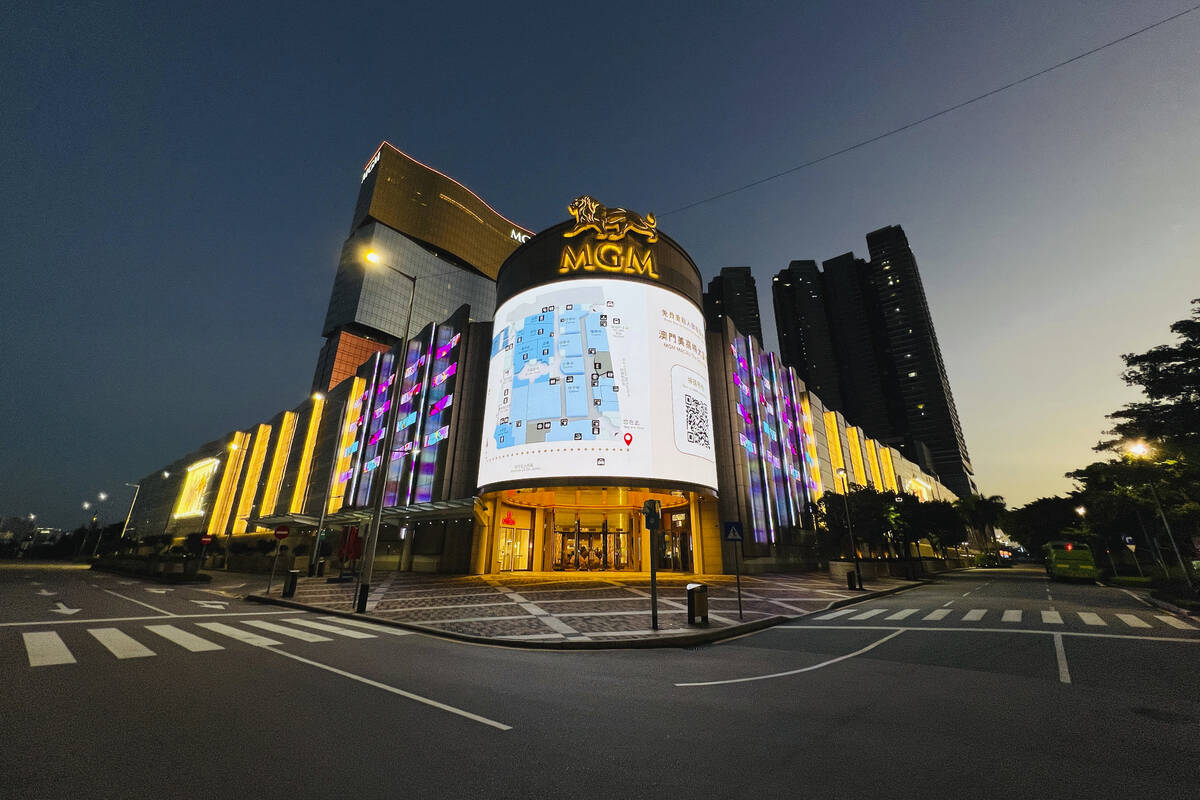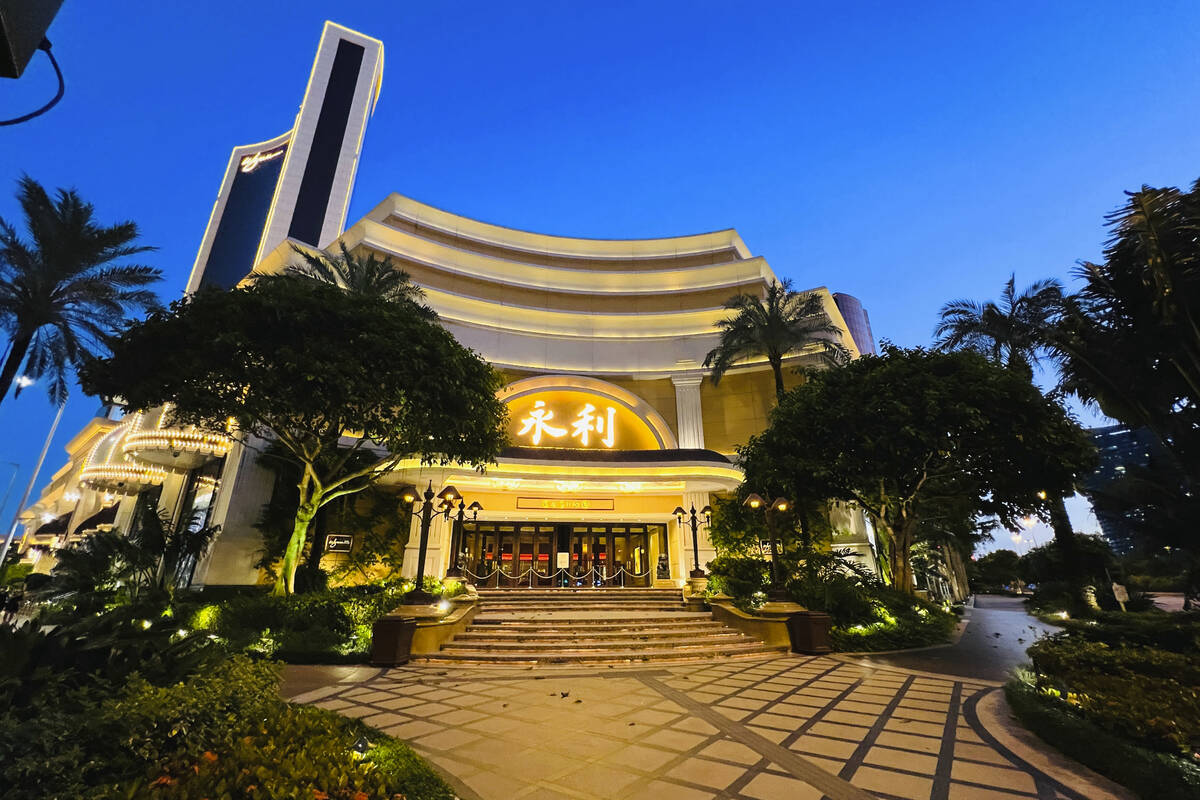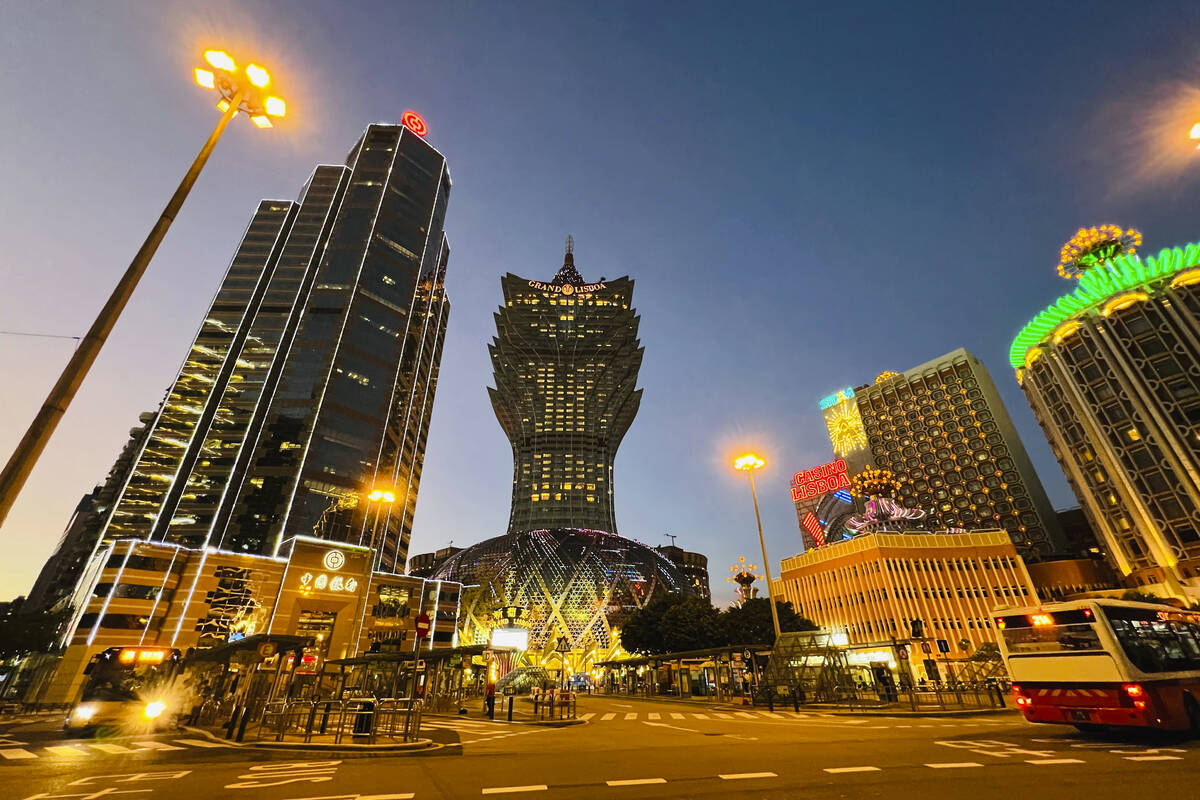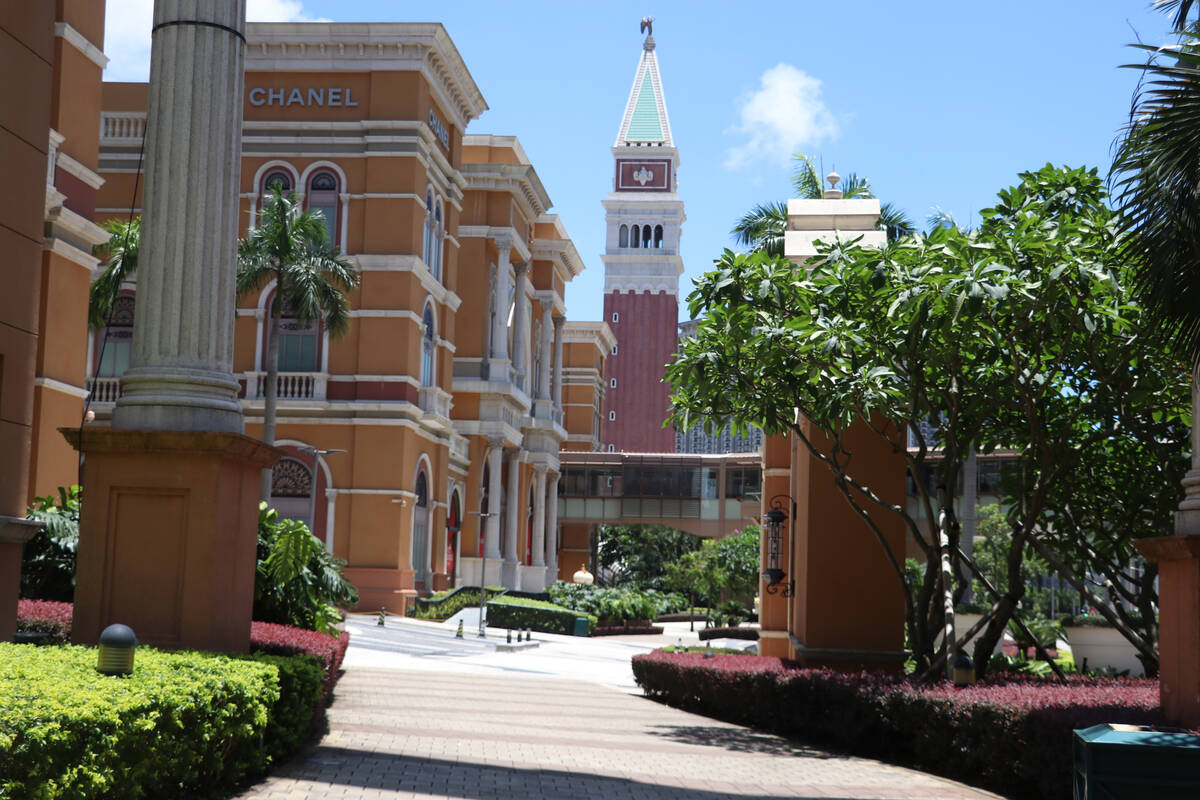Relicensing of Macao’s casinos coming on heels of major shutdown
Macao, the most lucrative casino gaming market in the world since 2006, is taking a page from an old Strip playbook.
Remember those efforts to draw families to Las Vegas in the 1990s? Casino companies across the valley built thrill rides, roller coasters and Strip-front entertainment to attract audiences to their resorts.
That’s what’s in store for Macao as the government there, taking cues from the Chinese central government in Beijing, is ordering investment in nongaming attractions as a condition of relicensing, a process that will occur through the end of the year.
Companies that already have invested billions of dollars in Macao must respond to a request for proposals by Sept. 14. Ten-year relicensing agreements are due to begin Jan. 1 and continue through Dec. 31, 2032.
Macao’s government late last month announced modifications to the region’s gaming laws that spell out some of the additional requirements that will be placed on companies operating in the region, including building more hotels, theme parks, ziplines, water parks and other family attractions.
Because there is little developable land in 46.6-square-mile Macao — much of the new Cotai attractions are built on infill land recovered from the sea — the government is looking for casino companies to develop nearby Hengqin Island with the strategy of having Hengqin as a center for families, close enough that adults can go to the casinos.
Higher tax rate
The new law also bumps the gaming tax up from 39 percent to 40 percent, although there’s a tax break for attracting foreign travelers as an incentive to bring more international visitors to the area.
The government hopes to attract foreign visitors to convention centers. While the new gambling law in Macao bumped up the tax rate, it also incentivized a tax break of 5 percentage points for foreign visitors who play in casinos.
Another potentially concerning addition to the gaming law is that the government will have a seat at the table on all strategic plans. That means Beijing will have eyes and ears on any potential changes on the horizon.
While gaming analysts express confidence that Las Vegas Sands Corp., Wynn Resorts Ltd. and MGM Resorts International will be successful in the relicensing process, there are no guarantees in a time when the Chinese central government is influencing the local government’s decisions and the relationship of Chinese President Xi Jinping and Washington D.C. is strained by disputes over trade, technology and human rights.
Andrew Scott, a gaming industry analyst who writes for the Inside Asian Gaming publication, said while he admires the lofty goal of the government to diversify Macao into an international city with world-class amenities and attractions, he contends the requirements listed in the RFP are a huge ask, especially since Chinese health and safety policies have quieted visitation to Macao for the last 1½ years.
“Given the stone-cold economic-zero of the current Macao market, the incredibly onerous expectations being imposed upon concession tenderers and the wide-ranging concerns of the international investment community about any investment connected to China, I suspect the Macao Tender Commission is in for a rude awakening,” Scott said. “Aside from the existing six concessionaires, who on Earth is going to be interested in investing in Macao?”
11 requirements
The RFP lists 11 requirements of licensees and 10 specific and annual quantitative metrics to explain how the licensees will provide those requirements.
“If a consulting client asked me to create dozens of business plans in 11 separate areas complete with quantitative metrics or qualitative descriptions in 10 categories for each of the dozens of business plans, I’d estimate perhaps a year to do a world-class job,” Scott said. “Six weeks is a total mission impossible, no matter how much money you throw at the task. The Macao concessionaires have done stupendous work developing Macao over the past 18 years, but they are not magicians or sorcerers.”
The 11 requirements look much like the Las Vegas blueprint for expanding visitation, with conventions, special events, sports and fine dining at the forefront:
* Increase international tourism. That includes developing infrastructure, undertaking marketing, enhancing the guest experience with better service and targeting specific overseas markets.
* Develop MICE. That’s meetings, incentives, conferences and exhibitions, the bread and butter of Las Vegas. Macao hopes to attract more international conventioneers.
* Develop entertainment. The government is pushing international film festivals and performers by top artists. But Chinese performers don’t resonate as well as big American entertainers.
* Hold major sporting events. Macao doesn’t have a large sports venue like Allegiant Stadium so sports is somewhat limited. But it does have an annual Formula One auto race. The government also suggested esports competitions.
* Promote art and culture. While Macao has a fascinating cultural scene blending Chinese and Portuguese influences, it doesn’t stand out like New York, Paris, London or Tokyo.
* Develop health-based tourism. Las Vegas has delved into medical tourism, particularly wellness, with its spas. Scott said Macao is no match in cosmetic surgery with Thailand, South Korea and Vietnam, and spa and less expensive spa and massage services are available in Zhuhai and Shenzhen.
* Create themed amusements. Asian theme parks are much different than American parks, looking more like outdoor museums than thrill rides. Still, there already are theme parks available with Disneyland and Ocean Park in Hong Kong.
* Promote Macao as a “city of gastronomy.” Scott likes the idea, saying food and beverage and five-star restaurants go hand in hand with resorts.
* Develop community-based tourism. The unique aspects of Macao’s East-meets-West culture has been tried with MGM Macau’s Grand Praca, which is a replica of a historic courtyard in Macao.
* Develop maritime tourism. Macao is on the seacoast but there is little beachfront tourism.
* Develop other projects. The government defines that as technology-related innovation and tourism.
Companies already invested
While the government will demand more of licensees, Las Vegas companies already have built several nongaming attractions. The three Las Vegas companies did not respond to requests about how much they’ve already invested in Macao, but it’s estimated to be in the tens of billions of dollars.
Sands has its Venetian canal replicas through a shopping mall, similar to the operation it once owned on the Strip. It also has built duplications of the Eiffel Tower and the Big Ben clock tower as part of its Paris-Macao and Londoner properties. The company manages thousands of square feet of retail, and every store and hotel property are connected to each other with climate-controlled corridors, similar to what downtown Minneapolis has.
MGM has The Spectacle, an indoor garden similar to Bellagio’s Conservatory, at MGM Cotai in addition to MGM Macau’s Grand Praca, which hosts public festivals and activities.
Wynn Macau also developed “Tree of Prosperity” and “Dragon of Fortune” animatronic shows at Wynn Macau, which also has its own version of the Bellagio fountain show in front of the building. An even larger water show has been built on a lake fronting Wynn Palace at Cotai, where visitors are delivered to the property from the street by cable car.
Right now, there are few foreign visitors to see those attractions. While most destinations measure visitation by the thousands and millions, the Macao Government Tourism Office’s June statistics showed 88.4 percent of the 380,671 visitors to Macao came from Mainland China. Visitors from the United States provided the fourth-most international total with just 22 visitors.
Comeback for Macao?
“We don’t think there is a strong view for any gross gaming revenue ‘come-back’ for Macao until next year (at the earliest) since it’s been near impossible to predict easing of mainland China’s zero-COVID-19 tolerance policy,” New York-based gaming analyst Joe Greff of J.P. Morgan wrote in a note to investors after Sands announced its second-quarter earnings in late July.
“We still have no clarity on if China may reverse its zero-COVID policy and what a new normal in Macao could look like,” added Las Vegas-based John DeCree of CBRE Equity Research.
Brendan Bussmann, founder of Las Vegas-based B Global, said both the COVID lockdowns and the relicensing process figure into the anxiety in the market.
“Operators are concerned enough about the current market dynamics, and the cloud of renewal makes it that much more (of an) interesting dynamic for a market that has been hamstrung by a zero-COVID policy that has challenged the market for 2½ years,” Bussmann said. “Asking operators to make strong commitments in this environment is a difficult task when they are still trying to figure out when the road to recovery begins. When it does, it will be strong. But until then, it’s a difficult environment to navigate.”
Andrew Klebanow, co-founder of C3 Gaming Casino Consultants Consortium and an analyst with Las Vegas-based Klebanow Consulting, is optimistic that Macao’s recovery would look much like Las Vegas’ uptick.
“What we’ve seen in regional markets and international markets is that there’s a tremendous amount of pent-up demand, particularly where there are lockdowns and there certainly are some of those in the People’s Republic of China,” Klebanow said in a recent interview. “The long-term prospects for Macao are excellent. It’s the short to medium that are the question marks.”
Klebanow said the biggest challenge facing Macao’s future is similar to the employment problems experienced in Las Vegas.
In Macao, many of the customer-facing workers are Filipino and after months of border closures, lockdowns and quarantines, many of them returned to their homes in the Philippines. Middle managers from Australia, New Zealand and the United States also went home, many of them saying they wouldn’t return.
“There’s a great presence of despondency right now. A lot of them are saying, ‘You know, I don’t want to go back,’ particularly after this most recent lockdown.’” he said. “If you can imagine that you’re a midlevel casino executive from Australia, you’re there with your wife and your kids and your dog and for two weeks you haven’t been able to take your dog outside for a walk, you’re asking yourself, ‘Do I really want to go back there?’”
In a webinar address to a chamber of commerce in Macao, Klebanow urged businesses to begin planning immediately for the rebound because when it comes, it would be fast and furious.
Meanwhile, companies operating in the market are reluctant to talk about the license renewal process because they don’t want to appear critical of the government. Repeated efforts to get comments from Sands, Wynn and MGM were unsuccessful, but company executives made some remarks in the company’s second-quarter earnings calls.
“It’s been obviously a tough couple of years,” MGM CEO Bill Hornbuckle said in response to an analyst’s question during the call. “It’s time to tell who ultimately shows up for submissions, but I’m pretty confident the original six licensees will be there. The 10-year (licensing) window presents some challenges when you think about we’re still in the midst of COVID.”
Hornbuckle said Macao’s push for sports and entertainment falls into his company’s wheelhouse.
“They’d love to see more of that activity in that market,” he said. “And so I think we’re ideally positioned to be able to do that as well.”
Hubert Wang, president and chief operating officer of MGM China, also said the company’s experience in attracting international guests to its casinos also will play in its favor.
“In terms of commitments, the government does focus on the overseas market,” Wang said. “So this is, I think, where MGM has a lot of strength with its global distribution network. So, we’ll be able to focus on that.”
In its earnings call in late July, Sands reiterated its confidence that Macao eventually would rebound and when it does, it would come back strong. Sands executives were buoyed by positive results from Singapore that took some of the sting out of the losses in Macao.
“We understand and appreciate what Macao is trying to achieve, diversifying the market, both in terms of the geographic origin of visitors and their motivations to visit is not a process that happens overnight,” Wynn CEO Craig Billings added in his company’s second-quarter earnings call earlier this month. “In Vegas, it took many years, and it was a concerted effort by both government and business. We were instrumental in leading that change here in Vegas, and we will, of course, continue to play our part in Macau’s journey to do the same.”
Roy Smolarz, an adjunct law professor at UNLV’s William S. Boyd School of Law and an international investment banker and managing director of Las Vegas-based RS Global Gaming Finance LLC, said it’s not surprising the local companies have little to say publicly about the relicensing because the process is competitive and they also don’t want to get on the government’s bad side.
“They can’t say very much because they don’t want to test the anger levels that might exist,” Smolarz said. “They’re very concerned about the attitude of the Beijing government regarding this industry. It’s not as simple as one might be led to believe.”
I. Nelson Rose, a law professor who writes the “Gaming and the Law” blog and recently taught at the University of Macao, said the ordered closure of the casinos in July may have been a blessing in disguise because the casinos would not be compelled to pay employees.
Sands acknowledged that it is paying employees during the closures. Wynn and MGM did not respond to inquiries about that.
“Some Macao casinos are still paying their staff, even with no revenue coming in,” Rose said. “However, even the most formerly profitable casinos cannot keep this up for too many months. At least the American-owned casinos can funnel money from the U.S. or Singapore for awhile, until their shareholders rebel,” he said.
Sands and Wynn have provided loans to their Sands China and Wynn Macau subsidiaries. MGM has a partnership with a daughter of late casino kingpin Stanley Ho to operate its two properties there.
Josh Swissman, founding partner of the Las Vegas-based Strategy Organization, said he’s confident Sands, Wynn and MGM will have their licenses renewed and will do what they’ve always done — invest in and build new attractions that will draw more people to the city.
“If you go back to the Macao of 20 years ago, there wasn’t much more than a bunch of gambling tables and a place to grab a bite and a hotel room to stay in,” he said. “Now, you’ve got huge theaters, great entertainment offerings that are there now that weren’t there previously, and there are tremendous retail components. I’ve never seen so many Gucci outlets in such a small space of geography there.”
But Rose isn’t so sure.
“I’m still pretty confident that the present six concession and subconcession (license) holders will all be renewed,” he said. “However, Beijing could use this disaster (the pandemic) to allow in a mainland company with loads of cash — perhaps a favored defense contractor? — to take over one of the six licenses.”
Smolarz has always been wary.
“The American operators in Macao have, in essence, understated the overall risk of the relicensing process,” he said. “I felt it was entirely valid and I was correctly predicting that Sands and Wynn would be in a terrible zone for a sustained period of time. I didn’t think it was a short-term blip because of the upcoming licensing.”
On the Stock Exchange of Hong Kong, the three Chinese subsidiaries of Sands, Wynn and MGM — Sands China Ltd., Wynn Macau Ltd. and MGM China Holdings Ltd. — have fallen 39.4 percent to $17.86, 53.6 percent to $5.09 and 58.7 percent to $4.25 over the past year, respectively.
In selling off its Las Vegas assets for $6.4 billion earlier this year, Sands has staked the company’s future on Macao, where it has invested billions.
The Review-Journal is owned by the Adelson family, including Dr. Miriam Adelson, majority shareholder of Las Vegas Sands Corp., and Las Vegas Sands President and COO Patrick Dumont.
Contact Richard N. Velotta at rvelotta@reviewjournal.com or 702-477-3893. Follow @RickVelotta on Twitter.
Tourism visitation to Macao
Since the beginning of 2022, 90.3 percent of the city's 3.5 million visitors came from Mainland China.
The top 10 source countries for visitors to Macao in that time frame:
— Hong Kong, 299,634 (8.7 percent)
— Taiwan, 34,565 (1 percent)
— Canada, 123 (less than 1 percent)
— United States, 110
— Australia, 87
— Japan, 64
— Malaysia, 45
— Republic of Korea, 38
— Brazil, 31
— Others, 305


























